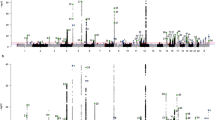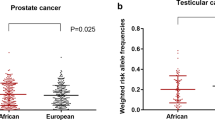Abstract
The incidence of cancer at sites other than the testis has been investigated in the families of 797 Norwegian and 178 Swedish patients diagnosed with testicular cancer during 1981-91. In the families of the Norwegian patients, the total number of cancers in the relatives was significantly lower than the expected number derived from national incidence rates [observed number of cancers 250, expected number of cancers 281.92, standardised incidence ratio (SIR) 0.89, 95% confidence interval (CI) 0.78-1.00]. This finding can be accounted for almost entirely by the finding of fewer than expected prostate and gastrointestinal cancers in the parents of cases. The other common cancers were found at slightly lower than or near the expected levels in the relatives. In the Swedish cohort, which accounts for less than 20% of cases, the observed number of cancers was very close to the expected number. Fourteen fathers of cases had prostate cancer compared with 27.57 prostate cancers expected, giving a SIR of 0.51 (P=0.006). Mothers had more lung cancers (ten cases observed, SIR=2.11, P=0.04) and cancers of the endometrium than expected (13 cases observed, SIR=1.73, P=0.09). These findings may be interpreted as support for theories proposing hormonal dysfunction as causing testicular cancer. Fifty-four gastrointestinal cancers were observed in the parents compared with 68.48 expected (SIR=0.78, P=0.082). Furthermore, testicular cancer was not found to be associated with the known dominantly inherited cancer syndromes [Familial breast (-ovarian) cancer, hereditary no-polyposis colon cancer]. However, one patient belonged to a Li-Fraumeni family, raising the possibility that testicular cancer may be an infrequent component of this rare cancer syndrome. This study supports the hypothesis that families of testicular cancer patients are not prone to cancer.
This is a preview of subscription content, access via your institution
Access options
Subscribe to this journal
Receive 24 print issues and online access
$259.00 per year
only $10.79 per issue
Buy this article
- Purchase on Springer Link
- Instant access to full article PDF
Prices may be subject to local taxes which are calculated during checkout
Similar content being viewed by others
Author information
Authors and Affiliations
Rights and permissions
About this article
Cite this article
Heimdal, K., Olsson, H., Tretli, S. et al. Risk of cancer in relatives of testicular cancer patients. Br J Cancer 73, 970–973 (1996). https://doi.org/10.1038/bjc.1996.174
Issue Date:
DOI: https://doi.org/10.1038/bjc.1996.174
This article is cited by
-
Meta-analysis identifies four new loci associated with testicular germ cell tumor
Nature Genetics (2013)
-
Close ties: an exploratory Colored Eco-Genetic Relationship Map (CEGRM) study of social connections of men in Familial Testicular Cancer (FTC) families
Hereditary Cancer in Clinical Practice (2012)
-
Family history of cancer and malignant germ cell tumors in children: A report from the Children’s Oncology Group
Cancer Causes & Control (2010)
-
Testicular Cancer and Genetics Knowledge Among Familial Testicular Cancer Family Members
Journal of Genetic Counseling (2008)
-
A physical analysis of the Y chromosome shows no additional deletions, other than Gr/Gr, associated with testicular germ cell tumour
British Journal of Cancer (2007)



